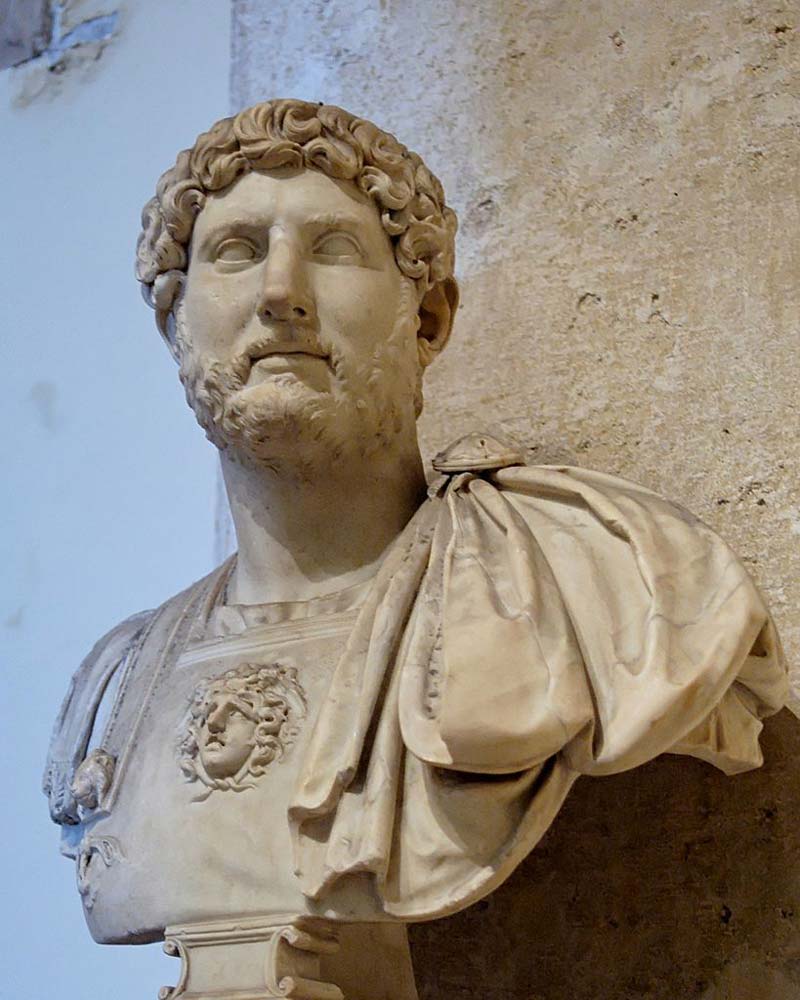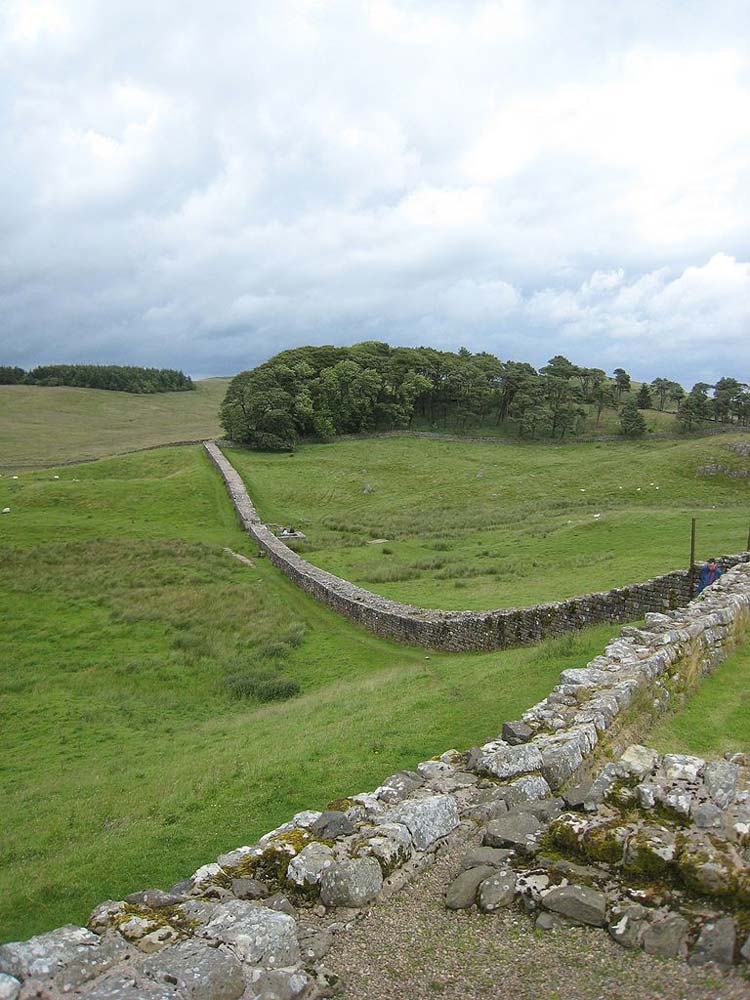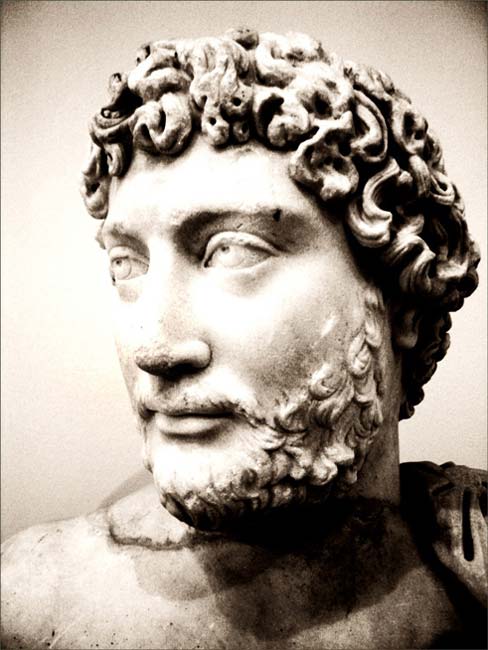| Hadrian | |
|---|---|
 |
|
| 14th Roman Emperor | |
| In Power | Aug. 10, 117 – July 10, 138 |
| Born | Jan. 24, 76 |
| Died | July 10, 138 (at age 62) Baiae |
| Royal House | Nervan-Antonine |
Hadrian (76-138 A.D.) ruled as Roman Emperor between the years of 117 and his death 21 years later. He is considered one of the so-called Five Good Emperors, and his reign was marked by internal stability and military success. Nevertheless, he abandoned some of his predecessor Trajan’s more remote conquests in order to consolidate Roman hold over the rest of the Empire. Hadrian associated himself strongly with his military, going so far as to spend meal times with his troops.
Early Life
Hadrian’s birthplace is not certain, with some sources giving his home town as Rome while others – including his personal history – suggest that he was born in Italica, a town near the city now known as Seville, Spain. Whatever the case, his family was part of the Roman establishment. His father was a prominent senator, Publius Aelius Hadrianus Afer. It is considered by some authorities that his later official biography was deliberately written in order to make it look as though he was a native of Rome, giving his birth date as January 24, 76 A.D.
Hadrian’s name comes from the town of Hadria, now known as Atri, a pre-Roman Italian settlement. His mother was from Gades (now Cadiz) and was the daughter of another prominent senatorial family. When Hadrian was ten, both his parents died, and he was then made the ward of Trajan. The young boy’s education followed the usual path set out for young noblemen, and he was particularly interested in Greek literature. He was recalled to Rome by Trajan when he was 14, and never again visited Italica.
Entry into Military Service
 The first army role that Hadrian took on was in the Second Legion, the Adiutrix, for which he served as tribune. A few years later, he was moved to the First Legion, known as Minervia, in Germany. In 98, the Emperor Nerva died, and Hadrian went personally to tell Trajan the news. Although he later spent a short amount of time in Greece, being elected as a citizen of Athens, his career at this time mostly centered around Upper Pannonia. Here, he was legate of another legion, the Fifth Macedonica, after which he served as the province’s governor.
The first army role that Hadrian took on was in the Second Legion, the Adiutrix, for which he served as tribune. A few years later, he was moved to the First Legion, known as Minervia, in Germany. In 98, the Emperor Nerva died, and Hadrian went personally to tell Trajan the news. Although he later spent a short amount of time in Greece, being elected as a citizen of Athens, his career at this time mostly centered around Upper Pannonia. Here, he was legate of another legion, the Fifth Macedonica, after which he served as the province’s governor.
While serving in the Fifth legion, Hadrian fought in a series of wars against the Dacians. It is said, although with little surviving evidence, that he was rewarded by Trajan – who was by now Emperor – for his military prowess. Hadrian’s next role was as one of Trajan’s legates on an expeditionary trip to Parthia, although his time there was without significant achievement. Nevertheless, he was soon appointed as governor of Syria when the incumbent had gone to address further problems with the Dacians. This was Hadrian’s first solo command.
By now, Trajan was mortally ill, and attempted to go home to Rome, leaving Hadrian in charge of the Roman rearguard in Syria. The Emperor was dying before he could complete his journey, so he adopted Hadrian as his heir. Once back in Rome, Hadrian efficiently ensured loyalty from his legions, dismissing those who seemed to be potential trouble-makers. Despite some controversy over whether his papers of adoption had been properly written – they were signed by Trajan’s wife, Plotina – the Senate endorsed Hadrian as the new Emperor.
Hadrian as Roman Emperor
 Despite his confirmation as the Empire’s supreme ruler, Hadrian delayed before returning to Rome, since the Jewish revolt had to be put down, and the frontier along the River Danube made safe. Hadrian directed that his former guardian, Attianus, carry out day-to-day duties in Rome, and the latter made sure of the new Emperor’s power base by fabricating a conspiracy among several hostile senators. These men were put to death without trial, and Hadrian was able to claim that since he was not in the city at the time, the idea had been Attianus’ rather than his own.
Despite his confirmation as the Empire’s supreme ruler, Hadrian delayed before returning to Rome, since the Jewish revolt had to be put down, and the frontier along the River Danube made safe. Hadrian directed that his former guardian, Attianus, carry out day-to-day duties in Rome, and the latter made sure of the new Emperor’s power base by fabricating a conspiracy among several hostile senators. These men were put to death without trial, and Hadrian was able to claim that since he was not in the city at the time, the idea had been Attianus’ rather than his own.
Hadrian developed a reputation for excellence in his military administration, but part of the reason for this was that his reign was relatively peaceful, with the Second Roman-Jewish War being the only really major conflict of his years in power. He proved himself to be a pragmatic Emperor, preferring to make peace with the Parthians in 121 rather than go to war. Hadrian also realized that the Mesopotamian lands conquered by his predecessor, Trajan, were almost impossible to defend in the long term and therefore decided to abandon them.
Instead, Hadrian believed that the Empire as it stood should be strengthened, rather than attempting any further expansions; indeed, his reign marked the end of any significant Roman expansion. To this end, he decided to construct fortified defenses on the borders of the Empire. The best known of these was in Britain, where Hadrian’s Wall – which marked the northern limit of Roman control – was to remain of great relevance for almost three centuries. However, there were also substantial fortifications along the Rivers Rhine and Danube.
Later Years and Death
The most serious military challenge to Rome during Hadrian’s time was the Jewish revolt which raged during the 130s. At first, Hadrian had shown some compassion, allowing Jerusalem – which had lain in ruins since the First Roman-Jewish War sixty years earlier – to be rebuilt, but he later adopted harsher measures, building a temple to Jupiter on top of the Temple. This resulted in a large-scale uprising, which may have resulted in the destruction of an entire Roman legion. The rebellion was finally crushed after almost four years, by which time more than half a million Jews lay dead. Hadrian continued to persecute the Jews for the rest of his reign.
A little after his final victory over the Jewish rebellion, Hadrian’s health began to fail. On July 10, 138, he died aged 62 in his country villa at Baiae. From the descriptions given by contemporary sources, it is generally thought that he died of heart failure. Hadrian was buried close to his villa, but a little later, his remains were taken to Rome to be interred in the Domitian Gardens. A year after his death, his successor as Emperor, Antoninus Pius, declared Hadrian to be a god and dedicated a temple in his honor.